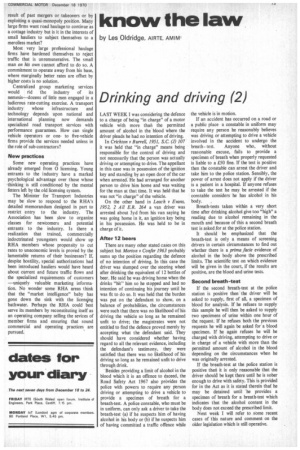know the law
Page 75

If you've noticed an error in this article please click here to report it so we can fix it.
by Les Oldridge, AM-E, AMIM'
Drinking and driving (2)
LAST WEEK I was considering the defence to a charge of being "in charge" of a motor vehicle with more than the permitted amount of alcohol in the blood where the driver pleads he had no intention of driving.
In Crichton v Burrea 1951, S.C. (3) 107 it was held that "in charge" means being responsible for the control of driving and not necessarily that the person was actually driving or attempting to drive. The appellant in this case was in possession of the ignition key and standing by an open door of the car when arrested. He had arranged for another person to drive him home and was waiting for the man at that time. It was held that he was not "in charge" of the vehicle.
On the other hand in Leach v Evans, 1952, 2 All E.R. 264 a van driver was arrested about 3yd from his van saying he was going home in it, an ignition key being in his possession. He was held to be in charge of it.
After 12 beers
There are many other stated cases on this subject but Morton v Confer 1963 probably sums up the position regarding the defence of no intention of driving. In this case the driver was slumped over the steering wheel after drinking the equivalent of 12 bottles of beer. He said he was driving home when the drinks "hit" him so he stopped and had no intention of continuing his journey until he was fit to do so. It was held that the burden was put on the 'defendant to show, on a balance of probabilities, the circumstances were such that there was no likelihood of his driving the vehicle so long as he remained unfit to drive; the magistrates were not entitled to find the defence proved merely by accepting what the defendant said. They should have considered whether having regard to all the relevant evidence, including the defendant's testimony, they were satisfied that there was no likelihood of his driving so long as he remained unfit to drive through drink.
Besides providing a limit of alcohol in the blood which it is an offence to exceed, the Road Safety Act 1967 also provides the police with powers to require any person driving or attempting to drive a vehicle to provide a specimen of breath for a breath-test. A police constable, who must be in uniform, can only ask a driver to take the breath-test (a) if he suspects him of having alcohol in his body or (b) if he suspects him of having committed a traffic offence while the vehicle is in motion.
If an accident has occurred on a road or a public place a constable in uniform may require any person he reasonably believes was driving or attempting to drive a vehicle involved in the accident to undergo the breathtest. Anyone who, without reasonable excuse, fails to provide a specimen of breath when properly requested is liable to a £50 fine. If the test is positive then the constable can arrest the driver and take him to the police station. Sensibly, the power of arrest does not apply if the driver is a patient in a hospital. If anyone refuses to take the test he may be arrested if the constable considers he has alcohol in his body.
Breath-tests taken within a very short time after drinking alcohol give too "high" a reading due to alcohol remaining in the mouth and because of this a second breath test is asked for at the police station.
It should be emphasized that the breath-test is only a means of screening drivers in certain circumstances to find out whether there is a prima facie evidence of alcohol in the body above the prescribed limits. The scientific test on which evidence will be given in the court, if the results are positive, are the blood and urine tests.
Second breath-test
If the second breath-test at the police station is positive then the driver will be asked to supply, first of all, a specimen of blood for analysis. If he refuses to supply this sample he will then be asked to supply two specimens of urine within one hour of the. request. If he refuses both the previous requests he will again be asked for* a blood specimen. If he again refuses he will be charged with driving, attempting to drive or in charge of a vehicle with more than the permitted amount of alcohol in the blood depending on the circumstances when he was originally arrested.
If the breath-test at the police station is positive then it is only reasonable that the driver should be kept there until he is sober enough to drive with safety. This is provided for in the Act as it is stated therein thaf he may be detained until 'he provides a specimen of breath for a breath-test which indicates that the alcohol content in the body does not exceed the prescribed limit.
Next week I will refer to some recent cases of this nature and comment on the older legislation which is still operative.






















































































































